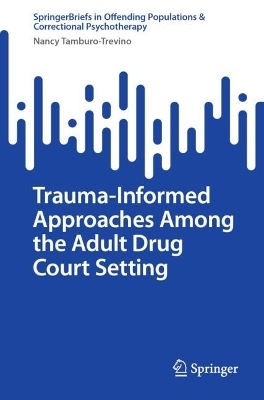
Trauma-Informed Approaches Among the Adult Drug Court Setting
Springer International Publishing (Verlag)
978-3-031-72367-4 (ISBN)
- Noch nicht erschienen - erscheint am 08.11.2024
- Versandkostenfrei
- Auch auf Rechnung
- Artikel merken
This brief explores trauma-informed practices in adult drug courts, highlighting the roles of judges, attorneys, court managers, case managers, law enforcement, treatment providers, and alumni. It emphasizes the need for all staff to operate from a trauma-informed care (TIC) model, prioritizing safety, choice, collaboration, trustworthiness, empowerment, and cultural considerations.
Drawing on the restorative justice movement, this volume addresses the link between trauma and criminal justice involvement, noting how incarceration worsens retraumatization and racial inequities. Implementing TIC can transform clients' experiences in the justice system.
This guide includes:
- An overview of TIC principles in practice.
- Worksheets for creating a trauma-informed setting.
- Examples of TIC application in various roles.
Essential for US drug court professionals, this resource provides practical guidance on trauma-informed care.
Nancy Tamburo-Trevino has been practicing the art of helping others heal for over 25 years. A graduate of The University of Texas at San Antonio with a Master of Arts in Educational Psychology and Simmons College with a Master’s in Social Work, she holds licensure as a Licensed Professional Counselor-Supervisor, Licensed Clinical Social Worker and Licensed Chemical Dependency Counselor in the state of Texas. She has worked with nonprofits in Texas, New York and California, focusing on helping those suffering from substance use disorders as well as multitude of other stressful life situations. She has experience in working in civilian personnel, within a major behavioral health insurance company, and youth organizations focusing on prevention strategies deterring substance use. She has expertise facilitating and co-directing women’s and youth spiritual retreats. Her most recent work experience is serving clients connected to felony drug court, providing integrated treatment services. She is certified in Eye-Movement Desensitization and Reprocessing (EMDR) Therapy, believing in the healing power of the brain and creating an environment where clients can begin their healing journeys. She is a clinical member for the American Association of Marriage and Family Therapy (AAMFT) and a current member with the National Association of Social Workers, the EMDR International Association (EMDRIA) and NAADAC, the Association for Addiction Professionals. She has facilitated staff trainings on use of self, trauma-informed care, presented at state and national conferences, and supervised Master-level students and Licensed Professional Counselor interns as they worked on their higher education degrees and state licensure.
Chapter 1. Introduction - Trauma-Informed Approaches among the Adult Drug Court Settings.- Chapter 2. History of Adult Drug Court.- Chapter 3. Cultural Considerations.- Chapter 4. What is Trauma-Informed Care (TIC)?.- Chapter 5. Roles of Drug Court Staff in providing Trauma-Informed Care.- Chapter 6. Putting Trauma-Informed Care (TIC) into Practice within a Drug Court: A Service Model.- Chapter 7. Maintaining the Service Model.- Chapter 8. Conclusion.
| Erscheinungsdatum | 19.10.2024 |
|---|---|
| Reihe/Serie | SpringerBriefs in Offending Populations & Correctional Psychotherapy |
| Zusatzinfo | XI, 55 p. |
| Verlagsort | Cham |
| Sprache | englisch |
| Maße | 155 x 235 mm |
| Themenwelt | Geisteswissenschaften ► Psychologie |
| Medizin / Pharmazie ► Medizinische Fachgebiete ► Psychiatrie / Psychotherapie | |
| Recht / Steuern ► Strafrecht ► Kriminologie | |
| Schlagworte | Drug Courts • Restorative Justice • Substance Use • THERAPEUTIC JUSTICE • Trauma-informed Practice |
| ISBN-10 | 3-031-72367-8 / 3031723678 |
| ISBN-13 | 978-3-031-72367-4 / 9783031723674 |
| Zustand | Neuware |
| Haben Sie eine Frage zum Produkt? |
aus dem Bereich


